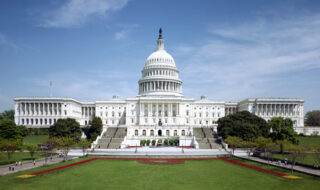April 3, 2024 Last Edit: July 26, 2024
Washington State Legislative Update–NFIB scores 85% kill rate on bills harmful to Main Street
Session Overview
The 2024 session of the 68th Washington State Legislature saw few drawn out floor fights or notable achievements. As usual, small businesses in our state will suffer a few more slights, in the form of more requirements and restrictions affecting operations and workforce interactions, but we were spared any major tax increase or sweeping regulatory mandate. For now.
- 60-day session, adjourned on time
- 128 bills tracked; supported 42 (33%), opposed 48 (37%), and monitored 38 (30%)
- Seven bills were signed into law despite our objections, resulting in an 85% success rate killing bills harmful to small business
- Three NFIB bills signed into law by Gov. Jay Inslee: HB 2072, HB 2136, and SB 5897
- The state director and NFIB members testified more than a dozen times in person, and provided written comments at least 6 times on bills and amendments important to small business
- NFIB members contacted state senators at least 400 times to oppose legislation that would have provided unemployment benefits to striking workers; both bills were defeated
Victories
- Defeated unemployment benefits for striking workers – NFIB played an important role in killing companion bills HB 1893 and SB 5777. The bills would have tipped the scales in labor negotiations heavily in favor of unions by reducing or relieving their obligation to establish a strike fund to provide for their members while striking. It would punish the business being struck by adding these unemployment insurance (UI) benefits to the employer’s experience-rated charges, and would likely lead to across-the-board UI tax increases on all businesses if the employer hits the tax cap or goes out of business due to the strike.
- Killed PTSD benefits for coroners – NFIB was the principal, if not only, opponent of HB 2031, a bill that sought to allow workers’ compensation benefits for county coroners, medical examiners, and their staff members claiming post-traumatic stress disorder (PTSD) from on-the-job experiences. PTSD claims are generally prohibited under our state-run workers’ comp system. There’s no doubt these individuals are exposed to death scenes, but that’s the job. And it’s one that 33 of our state’s county coroners asked the voters to give them. In the remaining six counties, highly trained medical professionals actively sought those positions. It should come as no surprise then, to any of them, that the job necessitates witnessing potentially traumatic settings. Moreover, the bill would have deemed these claims presumptive occupational diseases, all but guaranteeing any claimant would receive a financial award, perhaps including a lifetime pension. The Department of Labor & Industries own data shows PTSD claims cost an average of $650,000 each. The bill would have applied to both current employees and retirees. The bill passed the House, but died in the Senate Labor & Commerce Committee.
- Antitrust penalties – HB 2072, Attorney General request legislation, will replace the outdated $900,000 penalty cap on antitrust legal judgements with a triple-actual-damages penalty, which better aligns with the harm caused by anticompetitive tactics suffered by small businesses and other consumers.
- Prevailing wage sanctions – Also an Attorney General request bill, HB 2136 will prohibit participation in public works projects by businesses utilizing fraudulent successorship schemes. Basically, this occurs when a contractor cited for misconduct transfers the business assets, on paper, to an accomplice and continues doing business under a different name. This has long been a significant underground economy concern for NFIB and construction trade groups. HB 2136 may serve as a model for cracking down on criminal action in both public and private construction projects in the future.
- Business licensing reserve account – NFIB supported SB 5897, Department of Revenue request legislation, to replace the current $1 million statutory cap on the Business Licensing Service (BLS) reserve account with a three-month operating expense threshold. This adjustment will keep pace with inflation and other factors that drive cost increases for programming and maintenance of the state’s online BLS portal.
- Business licensing penalty waiver – This was not fully a success due to its late introduction, but NFIB made progress on legislation it plans to reintroduce next session to assist businesses harmed by government orders. Specifically, HB 2430 would allow the Department of Revenue to waive penalties and charge a lower application fee for a late renewal of a business license resulting from a government closure order issued due to a natural disaster or declared emergency. The bill won unanimous approval in the House Consumer Protection & Business Committee, passed the House Rules Committee, but failed to receive a floor vote before the House of Origin cutoff lapsed.
Defeats
- Right to Repair – This year the bills faltered in both the House and Senate committees with jurisdiction over the topic. The scope was increased to include electric wheelchairs and agricultural equipment. The wording of the bill seemed to sweep in boats and nautical equipment, as well as timber harvesting and hauling equipment. Despite herculean efforts, the sponsor and supporters were unable to placate new opponents or defeat tech lobbyists’ behind the scenes machinations, which killed the bill in this short session. To refresh reader’s memories, the bill originally would have required certain digital device manufacturers to sell, at fair market prices, the instructions, tools, and parts needed for individuals and independent shops to repair damaged cellular phones, pads, laptops, and other digital devices. Apple has been the primary opponent of the bill, seeking to preserve its restrictive and costly process for becoming an authorized service provider, forcing consumers to replace rather than repair damaged devices. Interestingly, Apple supported near identical legislation in California last year. This year’s companion bills were HB 1933 and SB 6276.
- Natural gas ban – HB 1589 will allow Puget Sound Energy to halt extension of gas supply lines to new developments, and eventually abandon service to existing natural gas customers. As the Washington Policy Center explains, “There has been some discussion about whether the bill actually bans natural gas for residential customers. A last-minute legislative change removed a section that would have allowed PSE to waive the obligation to serve existing natural gas customers. However, the bill still gives state utilities commissioners the authority to require PSE to move customers from natural gas to electricity, independent of the obligation to serve.”
- Including protected classes in equal pay act – HB 1905 will double-up on employer liability by making the same actions punishable under both the state equal pay act, administered by the Department of Labor & Industries, and the Washington Law Against Discrimination, administered by the state’s Human Rights Commission. Thus, employers could be investigated and cited by two agencies at once for the same alleged violation. Moreover, the bill will allow a worker to file multiple wage complaints based on each “protected class” of which the worker identifies as a member. The bills do not contemplate which agency’s decision controls in the event L&I and the HRC come to different conclusions about the same case. It appears a business owner could be found guilty and punished by one agency while the other finds the employer not guilty for the same action.
- Workers’ compensation temporary total disability – HB 1927 will increase workers’ compensation payouts for these claims, increasing premiums due to experience rating, and potentially creating overpayment situations where injured workers must repay the State Fund for unearned benefits, without expediting actual payment of benefits when a final determination is made.
- Gun shop building requirements – HB 2118 establishes standards that are excessive and threaten to put law-abiding gun shops out of business. One NFIB member received a bid to install surveillance cameras and provide data storage as required by the bill with a cost estimate of nearly $300,000. That does not include additional costs to meet structural requirements the bill would add. HB 2118 provides a template to force the closure of other small businesses under the guise of building and “safety” codes.
- Sanitary facilities on construction sites – NFIB appreciates the desire to expand the construction workforce; however, several provisions of HB 2266 will be largely unworkable, particularly on undeveloped construction jobsites. For instance, an earth-clearing contractor would have great difficulty providing a private, lockable facility that is not a bathroom, for the expression of breastmilk, cleaning of pumping equipment, and milk storage. The bill would require contractors provide workers an “… adequate and convenient supply of menstrual hygiene products …” and allow workers to file complaints against their employers over quantity, quality, brand, type, or features of those products, convenience of the product storage location, or for misidentifying which workers may need those products. The bill would put both employers and workers in uncomfortable situations where inquiries or requests regarding the provision of products and facilities may be unwelcome or intrusive. It’s unfortunate that lawmakers bought the argument that opposing the bill would be deemed “anti-woman” in the coming election.
- Employer political speech – SB 5778 goes far beyond protecting workers from hearing unwanted information about an employer’s political or religious opinions. It would prevent an employer from explaining the risks or benefits of unionization, describing regulations or legislation affecting the business or the employees themselves, or even expressing an opinion on topics required to be covered at government-mandated employee gatherings (like safety meetings). Similar laws in other states are being litigated based on federal preemption under the National Labor Relations Act and US Constitution.
- Grocery workers – SB 6007 requires certain grocers who purchase one or more additional stores to retain the staff of the acquired store(s) for six months, or pay them severance equal to what the discharged workers would have earned during that period. This creates a template for future legislatures to require other business owners to be bound to similar conditions when they purchase or merge with competitors.
NFIB is a member-driven organization advocating on behalf of small and independent businesses nationwide.
Related Articles














